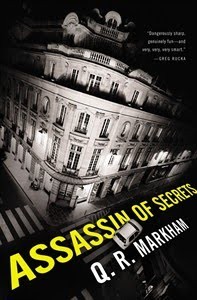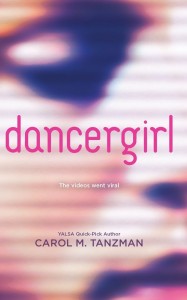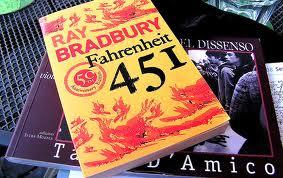Monthly Archives: November 2011
Averting Disaster
by John Gilstrap
Okay, Damage Control (July, 2012) is finished and submitted and the publisher is happy. Now I can come clean:
By way of background, my Jonathan Grave books are slated as the lead titles for July in their respective years of publication. The first week of July, to be specific, chosen to coincide with ThrillerFest. Being lead title is a big deal because of the horsepower that get focused behind the book. Recognizing that there’s only one (maybe a couple) lead title per genre per publisher per month, and given that there are only 12 months in a year, it’s a position worth earning, and once earned, it’s definitely worth defending.
In order to make that July 1 slot, I have to submit my manuscripts by September 15. That might seem like a lot of lead time, but it’s really not, given all that goes into the production and marketing of a book. If you miss the deadline, you imperil your spot on the list.
Okay, now for the living nightmare.
In mid-July (the week after I returned from ThrillerFest), I realized that I had painted myself into a corner with Damage Control. I had too many characters, the story was rambling. I’d lost control of the damn thing. I’d written a little over 300 pages that just weren’t going to work, and I faced the reality that is no less daunting for a writer than it must be for a surgeon: If the patient (book) was going to live, it would need serious surgery. Thus, on or about July 20, with less than two months to go before my deadline, I amputated over 200 pages. I essentially took myself back to the end of the opening sequence, and rebuilt. Understand that my manuscripts run 400-430 pages.
I told my editor that I was going to blow my deadline, but “not by that much.” I didn’t have any idea how I could make even an extended deadline, but there was no way I was going to lose my spot in the catalog. Too many people work too hard on my behalf to let them down that way. I’m a professional, and professionals plow through to the end.
When failure is not an option, success is guaranteed.
Meanwhile, my Big Boy job had me on the road nonstop, and Joy’s dad’s health started declining rapidly. When it rains, it pours, right? Work days grew to be eighteen hours long and weekends disappeared entirely. If I wasn’t busting my ass for my day job, I was busting my ass for the night job. Sleep was a five- to six-hour per night luxury.
I’ve never written so hard in my life–or under such pressure. But you know what? I got it done. And, if you ask me, it’s really, really good. From mid-late July till October 17 when I submitted the manuscript, I wrote, rewrote and polished 315 manuscript pages. I don’t know how I did it, and I pray that I’ll never have to do it again.
If there’s a lesson here beyond the old standby of don’t-let-this-happen-to-you, it’s that any obstacle can be overcome if you want it badly enough. When you’re caught in a crack, the last thing to let go of is your professionalism. Friends will wait for you, family will understand. Employers are paying for an honest day’s labor, and you owe them that and more. With what’s left, you turn to the next obligation in line.
On a personal level, I learned an invaluable lesson that is reflected in one other accomplishment: Here it is mid-November, facing another September 15 deadline in 2012, and I’ve already started the second chapter of the next book. My goal (and it’s a soft goal, not a sword worth falling onto), is to have this one finished by June 15. I think I’d like to try to enjoy a season of book conferences without staring down the maw of a deadline.
We’ll see . . .
ADR3NALIN3
I wanted to share with TKZ that Michelle Gagnon and I will be launching a new group blog geared for thriller authors writing dark YA. Our blog will be called ADR3NALIN3. I hope you’ll check it out at this LINK.
ADR3NALIN3 is the brainchild of a group of authors who write the dark side of middle grade and teen fiction. We are far from cozy and we don’t do warm and fuzzy. We want to make your skin crawl and your heart beat faster as you venture deeper into the dark recesses of our imaginations. Reality can be overrated or just plain scary. We offer you a savory feast of chilling contemporary thrillers, eerie mysteries, fantasies from your worst nightmares, and our bent and twisted take on the paranormal.
Michelle’s new series sounds absolutely fantastic—dark & delicious. Here’s a sneak peek.
Sixteen-year-old Noa has been victimized by the system ever since her parents died. Now living off the grid and trusting no one, she uses computer hacking skills to stay safely anonymous and alone. But when she wakes up on a table in an empty warehouse with an IV in her arm and no memory of how she got there, Noa starts to wish she had someone on her side.
Enter Peter Gregory, A rich kid and the leader of a hacker alliance. Peter needs people with Noa¹s talents on his team. Especially after a shady corporation called AMRF threatens his life in no uncertain terms.
But what Noa and Peter don¹t know is that she holds the key to a terrible secret, and there are those who¹d stop at nothing to silence her for good.
Fans of THE GIRL WITH THE DRAGON TATTOO will devour the story of Noa, a teen soulmate to Lisbeth Sander.
And another of our members launches a book tour this week, Carol Tanzman. Here’s a sneak peek of her book:
Dancergirl
by Carol Tanzman
Harlequin Teen, Nov 2011
Part mystery and part romance in this digital age where teens put their lives online, dancergirl (Harlequin Teen) will grab you from the first page and won’t let you go until the thrilling conclusion. When someone secretly films 16 year old Ali Ruffino dancing at a concert and posts the video online, things start to get out of control as the dancergirl craze takes on a life of its own. Her admirers want more, the haters hate, her best friend Jacy—even he’s acting weird. And if someone watching has their way, Ali could lose way more than just her love of dancing. She could lose her life.
We are officially starting active posts during the first week of January 2012 but since we have two virtual book tours starting in Nov & Dec, we are getting the word out earlier. I’ve featured two of our authors, but visit our site to see who else has joined us. We also hope to promote the genre with featured guests. I hope you’ll follow our new blog and on twitter at @ADR3NALIN3BOOKS.
Once we get going, what kinds of posts would you like to see on ADR3NALIN3? What have you liked most about following TKZ?
The trashing of a guerrilla library
I woke up this morning to the news that police in New York have trashed a library. Literally.
According a firestorm of tweets and reports that are starting to emerge, early this morning, NYPD swooped down on the Occupy Wall Street camp in Zuccotti Park, routed the protesters, and tossed everything in dumpsters–including 5,500 books that had been donated to a pop-up guerrilla library.
I know that many people dismiss the OWS protesters, or reject their tactics, or simply think they’re silly. But the wanton trashing of thousands of books by police is a scene I never thought I’d see in America. In his book FAHRENHEIT 451, Ray Bradbury’s vision of the future was right on the money.
The destruction of the little “People’s Library” is bound to become a symbol of the squelching of dissent in our society, and a rallying cry for new Occupy protests.
I just wonder if a copy of FAHRENHEIT 451 is sitting in that trash dumpster in New York City.
We can’t say ol’ Ray didn’t try to warn us.
Update (5:40 p.m. ET): A recent Tweet from the NY mayor’s office indicates that the OWS library books are actually being detained in a Sanitation Dept. garage. They even posted a “proof of life” photo, so people would know that at least some of the books are alive and unharmed.
Good to know.
NaNoWriMo Writing Tips
Decency
A New Slippery Slope
Advertising in e- books. Are you ready for it? Do you want it? Granted, advertising in a book is not a new idea. There are paperback imprints that in the front or back of one book will place ads for other books which they publish which may be of similar interest to the reader. There was a somewhat short-lived experiment in the early 1970s to place four-color ads for cigarettes in the middle of paperbacks as well. But…advertising in an e-book?
That is the idea currently being floated by Harper UK. As it is currently conceived, such commercial interruptions would be limited to works of non-fiction (apparently because we readers of fiction have such easily derailed attention spans). The example which was presented was that an e-book concerning bird-watching could contain an advertisement for binoculars. You can see where this could go. Imagine the irregularly scheduled commercial in the e-book version of a sex manual. Or an ad for ginsu knives in a true crime book. Given the ever-growing popularity of the iPad (not to mention the Kindle Fire) such a commercial or advertisement could manifest itself in multiple media forms. Would it be a page that you could skip by, or perhaps one of those annoying popups for a movie or commercial product? And make no mistake: such a plan may be limited to non-fiction books at the moment, but if the trial with non-fiction e-books is at all successful, works of fiction will be next.
With that in mind, here is a bit of free advice: if you are fortunate enough to have a major entity, be it a publisher or Amazon or whoever, interested in publishing your work, make it your business to determine how and if your agreement addresses this issue. The argument from the other side may be that such an addition to your work in e-form is part of the content, or form, or your work, and thus falls under the purview and authority of the publisher. If you are in a position to negotiate this point (in other words, you haven’t signed anything yet) there are a number of points to consider. Two of the bigger ones would substance and form. You might object to ads for certain products (alcohol, condoms, and firearms, to name but three examples) or products manufactured or sold by a certain companies (The GAP, Wal-Mart, Progressive Insurance, and McDonalds, to name but a few). You might also have some concerns with regard to how the commercial is presented, or the product portrayed, in Your Book. An even bigger issue, however, concerns who will get the cheddar from the sale of such ad placement. When an ad is placed in your e-book, will your cash register go Ka-ching? Or will the proceeds of such go into the publisher’s coffers to offset the costs of publishing your e-book?
Is this an issue yet? No; but I believe it will be soon. Authors, published and prospective: what do you think about advertising in an e-book? Do you like the idea, or not? Why? And readers. Would you mind an occasional advertisement? Or are you happy to have a place to go that is ad-free?
Eleventh Day of the Eleventh Month
A debt we cannot repay.
It’s Veteran’s Day here in America. To all who have served, thank you. For everything.
The sincerest form of flattery?
So news broke this week that Q.R. Markham’s debut novel, ASSASSIN OF SECRETS, was being pulled from shelves after the publisher (Mulholland Books) discovered that numerous passage had  allegedly been taken from other sources.
allegedly been taken from other sources.
To get a sense of what they mean by “numerous,” follow this handy link. Apparently the only part of the book that Q. R. Markham didn’t plagiarize was the overly generic title and his bio.
My question is, why would a new author do such a thing? And more importantly, after all the plagiarizing scandals of the past decade (see: Stephen Ambrose, Kaavya Viswanathan, et al), how could he blithely expect not to get caught? In the digital era, all you have to do is type in a key phrase, and Google can usually instantly match it to a source. So why take the risk?
I have to wonder what the months leading up to his novel’s release have been like for Q. R. Markham. Was he basking in the thrill of having gotten away with something? Was he w aking up nightly in a cold sweat, shaken by nightmares of being discovered? (Something about his pose in the photo to the left leads me to suspect probably not.) Or had he actually managed to convince himself that the work was his own?
aking up nightly in a cold sweat, shaken by nightmares of being discovered? (Something about his pose in the photo to the left leads me to suspect probably not.) Or had he actually managed to convince himself that the work was his own?
And how did Mulholland Books (an imprint of Little, Brown) get so far along in the process without discovering the malfeasance? The book was released a week ago, which means that ARCs of it made the rounds months earlier. In fact, Publisher’s Weekly gave ASSASSIN OF SECRETS a glowing review, praising it as “quirky” and “entertaining.” My favorite part: “the obvious Ian Fleming influence just adds to the appeal.” Yes, of course, the Ian Fleming “influence.” As in, passages were extracted directly from his James Bond series and dumped into Markham’s narrative.
But he didn’t limit himself to stealing from merely one giant of the spy genre: Robert Ludlum’s books were also liberally borrowed from. Other excerpts have been attributed to John Gardner, Charles McCarry, Geoffrey O’Brien, and James Bamford. I have to admit to being a bit tickled by the inclusion of my pal Raymond Benson’s HIGH TIME TO KILL. If you want a great espionage read, go to the source on that one.
Here’s the thing. I’ve been forced to jump through numerous legal hurdles with each book, ranging from acquiring permissions for song excerpts and poems, altering university and town names, and changing one benign reference to Star Wars for fear of igniting a legal response from mighty Lucasfilm. So who feel asleep on the job here?
I have a frie nd who recently discovered that his novel ULTIMATE RUSH was being made into a film by Sony Pictures- yay, right? Except here’s the rub: they never optioned it. They changed the title to PREMIUM RUSH, altered a few character names, but adhered to the overall plot about a bike messenger on the run. Joe has been fighting them in court, so
nd who recently discovered that his novel ULTIMATE RUSH was being made into a film by Sony Pictures- yay, right? Except here’s the rub: they never optioned it. They changed the title to PREMIUM RUSH, altered a few character names, but adhered to the overall plot about a bike messenger on the run. Joe has been fighting them in court, so  far to no avail. Theft, pure and simple. Apparently in Hollywood, it’s easier to get away with that sort of thing.
far to no avail. Theft, pure and simple. Apparently in Hollywood, it’s easier to get away with that sort of thing.
This has to be hugely embarrassing for Mulholland, especially since it’s a newer imprint that just started releasing books this past April. The question now is what happens to Markham? His second book has been canceled (obviously, although I’d love to see who he robbed to write that one), and I’m guessing he’ll be asked to return the advance. But will he also be sued by Mulholland? How about the people whose work he co-opted? (Here’s your shot at the big bucks, Ray).
Anyway, here’s the takeaway. You never rip off another writer’s clever turn of phrase–ever. It’s cheap and wrong and basically illustrates that you’re incapable of an original thought. Shame on Q. R. Markham for thinking he could get away with it.
Cornered
Have you ever written yourself into a corner? Have you progressed at least midway through your story and then realized your hero is going down a black hole and you don’t know how to get him out?Recently, I found myself in this situation. In my synopsis, which acts as my writing guideline, I was up to the part where the hero, Lord Magnor, goes to the underworld to obtain a sacred book stolen by Hel, Queen of the Shades. To get there, he has to die. Circumstances with the heroine make him despair of their future together, and so he takes a poison pill that another character has given him.
Here is what my synopsis said:
He awakens underground in front of an iron gate. This leads to a gold-paved bridge that crosses the river Gjoll. Beyond is Helheim, where Hel resides. A giantess guards the gate and asks him for the password. If he fails to give the right answer, she’ll toss him in the river and it will carry him to the land of fire and eternal torment.
Magnor figures out a way past and meets Hel. She isn’t willing to give up the Book of Odin, not even for the mead he’s brought. So he creates a diversion and steals the sacred book.
Now this presented several problems. How does he get past the giantess when he fails to give the right password? How does he get into Hel’s palace? What kind of diversion does he create, and how does he steal the ancient relic?
I printed out these questions and sat on my “thinking couch” until the answers came to me. First of all, if he fails to give the right password, the giantess won’t throw him in the river. Instead, she’ll doom him to spend eternity in the company of other lost souls.
At that point, he has to find another way past the gate. He doesn’t have any cutting tools or acid to break in at some point farther down the line. And even if he could do so, how would he cross the raging river? What he does have are his wits, so he eases into the shadows and cheats by climbing up the rocky wall lining the chamber and gaining access to the opposite bank that way. In other words, he goes up and over instead of across. It’s the Kobayashi Maru solution from Star Trek. If you’re in a no win situation, change the rules.
So what about confronting Hel? He decides upon a frontal approach, stating his business to the palace guards in such a confident manner that he convinces them to allow him an audience with the queen. I’m glossing over the details but suffice it to say he states his case to her and she refuses to comply. Now we need a distraction so he can steal the book that rests in a glass case.
In the story, I’ve already planted the seeds for this solution. He’s been given a magic horn that is supposed to sound a warning when the demon, Loki, is near. But what will happen if Magnor blows the horn within Hel’s palace? He does so, and glass shatters throughout the hall, including the case protecting the sacred book. He snatches the artifact as Hel’s minions surround him.
Now what? The heroine has been told she must obtain a golden apple from the Fae to revive him. But fairies aren’t part of Norse mythology, which my story is based on. Here is what my synopsis says:
Erika must return him to the land of the living. She realizes how much he means to her and won’t risk losing him. However, reviving him isn’t easy. Aware that she only has a certain window in which to resuscitate the warrior, she saves him just in time.
Okay, how does she save him? Anytime you leave things vague like this in your synopsis or writing outline, eventually you have to come up with the details. Again, I’d already sowed the seeds within the story. Erika, a descendant of Odin, has inherited some of his shapeshifter powers. She cannot change her own form, but she possesses the power to manipulate the earth.
Odin also had the “breath of inspiration”, and this reminded me of the breath of life possessed by the Mord Sith in Terry Goodkind’s Sword of Truth series. What if, instead of going to the Fae, Erika is inspired by the figurines of fairies she’s designed in her pottery studio? Fairies might not be real, but what about fairy dust? And so she uses her innate power to revitalize the hero with the magical dust she breathes into his mouth.
As you can see, whatever corner you back your hero into, if you’ve laid the proper groundwork for your story, the solution will arise from material you’ve already planted. So go ahead and gloss over these details in your selling synopsis, but be assured when you come to them in the story, the muse will help you fill in those plot holes. You can rewrite your synopsis accordingly.
So who else has backed a character into a corner, and how did you get him out?







